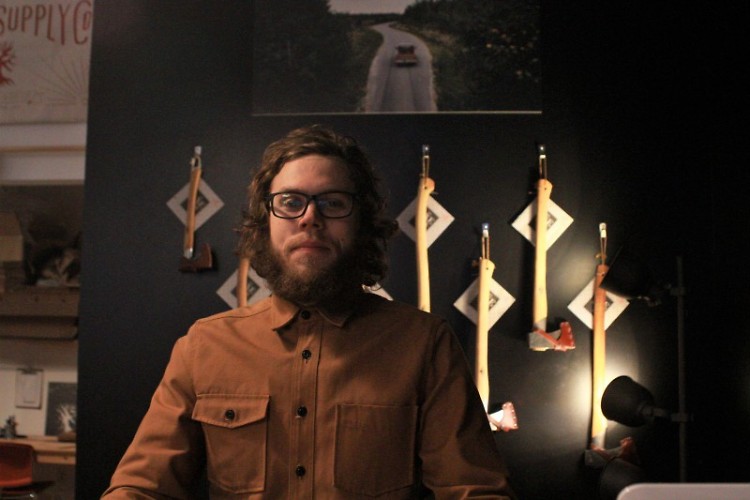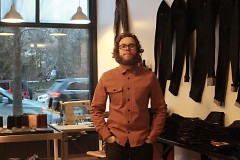“It started when I was a kid. Every kid wants their pants to fit tighter, at least I did.” Rusty Zylstra says, leaning over the sturdy, wooden counter of his apparel and leatherwork store, Mercy Supply Company. Its storefront, run by Rusty and his wife Kate, sits between Rowster Coffee and Mokaya, on the corner of Wealthy Street and James Avenue.
While the storefront has existed for just over a year, Rusty has been building the company for the better part of a decade and was working towards its inception for as long as he can remember. His first memory with clothing construction is from when he was eleven or twelve and was given a pair of not-so-gently used brown pants.
“They were bell bottomed, but I liked the way the upper part fit. I tapered them and made them fit the way I wanted them to. That was when I was eleven or twelve and playing in punk bands.” Before long, Zylstra had taught himself how to construct a pair of pants. “I would alter my clothes, make them fit differently, and realize that I liked the wear pattern of this certain style, and would think ‘oh, I might want all my clothes to look like that eventually.’”
Rusty describes experimenting further, in his teens: sewing double-fronts of a preferred canvas onto another pair of jeans, patching up holes, installing patches.
“Through working like that, I got the concept of how to make something, by layering over something that already existed.” Mercy Supply was established in 2009 when Rusty was living and working out of a shed.
“Just a 10 x 10 shed,” Rusty explains, “that I built a loft and installed a wood shed in, making belts for friends. I had zero expectations. I wasn’t a great designer, that was something I had to find.” Mercy Supply Company moved around the city for the next nine years. Throughout that time, the headquarters of his operations could be found in his bedroom, back in the shed, and at Carriage House.
Those first years were when Rusty developed his skills in design, creating early versions of his Brimley and Baraga bags. After perfecting his bag design and construction, Rusty revisited his early passion of clothing construction, creating pants and shirts out of the same durable and sturdy material he uses to make the bags. They are stiff at first, but after they break in, they will be molded to your body and how you wear them.
Rusty believes that the company is much bigger than he and Kate. While he crafts all the leather goods and bags in Grand Rapids, he emphasizes that John and Jess Harmon do the screen printing for the bandanas and shirts. Lance Nelson does the photography. He works with a small shop in Los Angeles that helps him produce his apparel.
“I like to think of the materials we use as people that are a part of it as well,” he says. He gets his duck canvas from a mill in New Jersey. He works with YKK to get zippers and rivets, “because they care.” He lists his suppliers on his website, a majority of which are based in the Midwest or New York. In the top left corner of the website’s home page, there is a tab that reads “journal.”
Clicking the link reveals a web page of pictures of Rusty, his wife Kate, and a varied gang of friends exploring the mountains and beaches of New Zealand or motorcycling and picking wildflowers on Drummond Island. Scrolling all the way back to the beginning, you will see a younger Rusty, hard at work at a sewing machine, handcrafting a canvas-and-leather apron.
When asked why he chose to include the journal on the company website, why he thought the pictures were important enough to link them to the website, he responds, “I think a lot of people feel limited in their lives. It’s to encourage people to go out and do something.”
The Rapidian, a program of the 501(c)3 nonprofit Community Media Center, relies on the community’s support to help cover the cost of training reporters and publishing content.
We need your help.
If each of our readers and content creators who values this community platform help support its creation and maintenance, The Rapidian can continue to educate and facilitate a conversation around issues for years to come.
Please support The Rapidian and make a contribution today.


